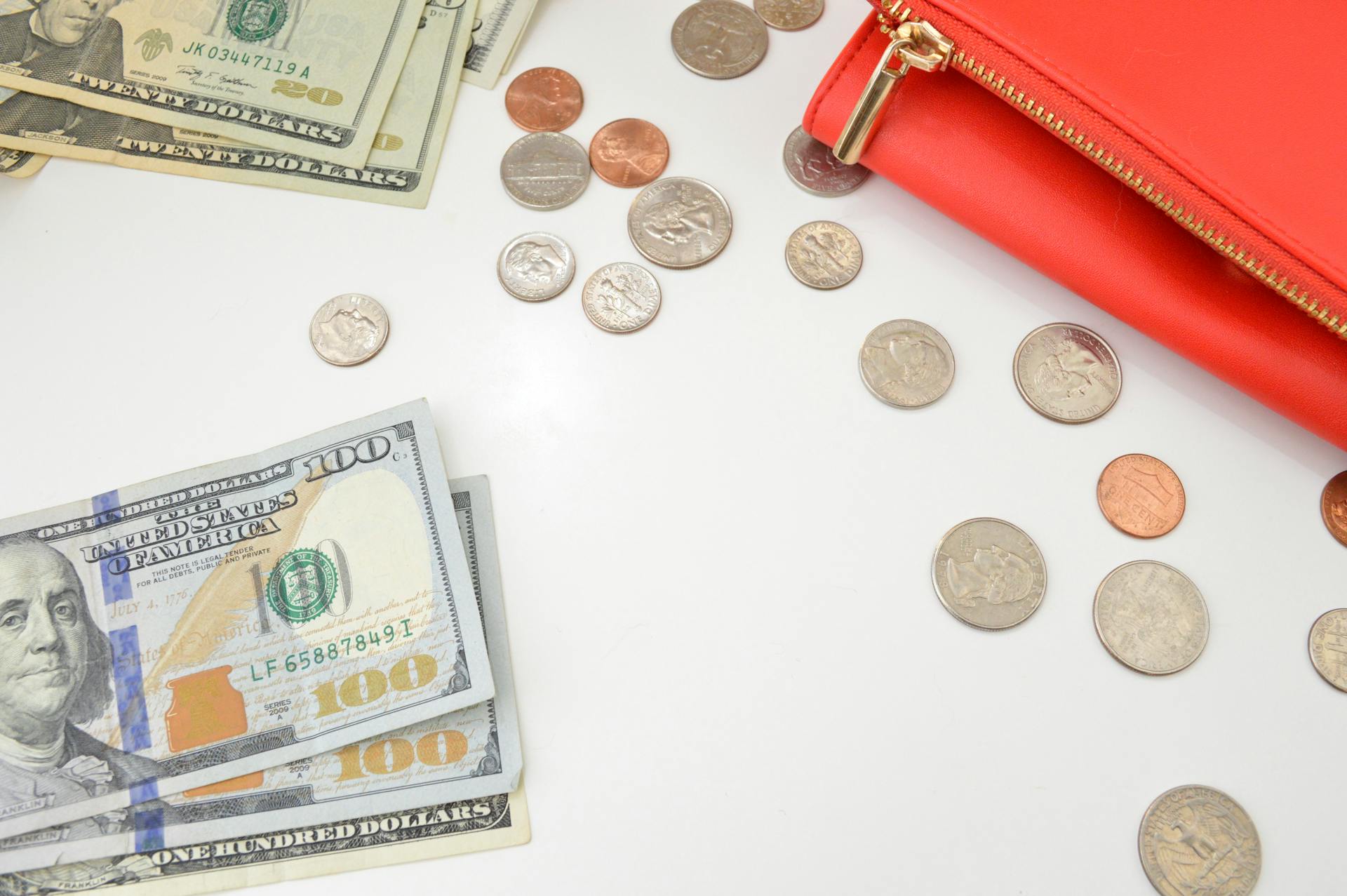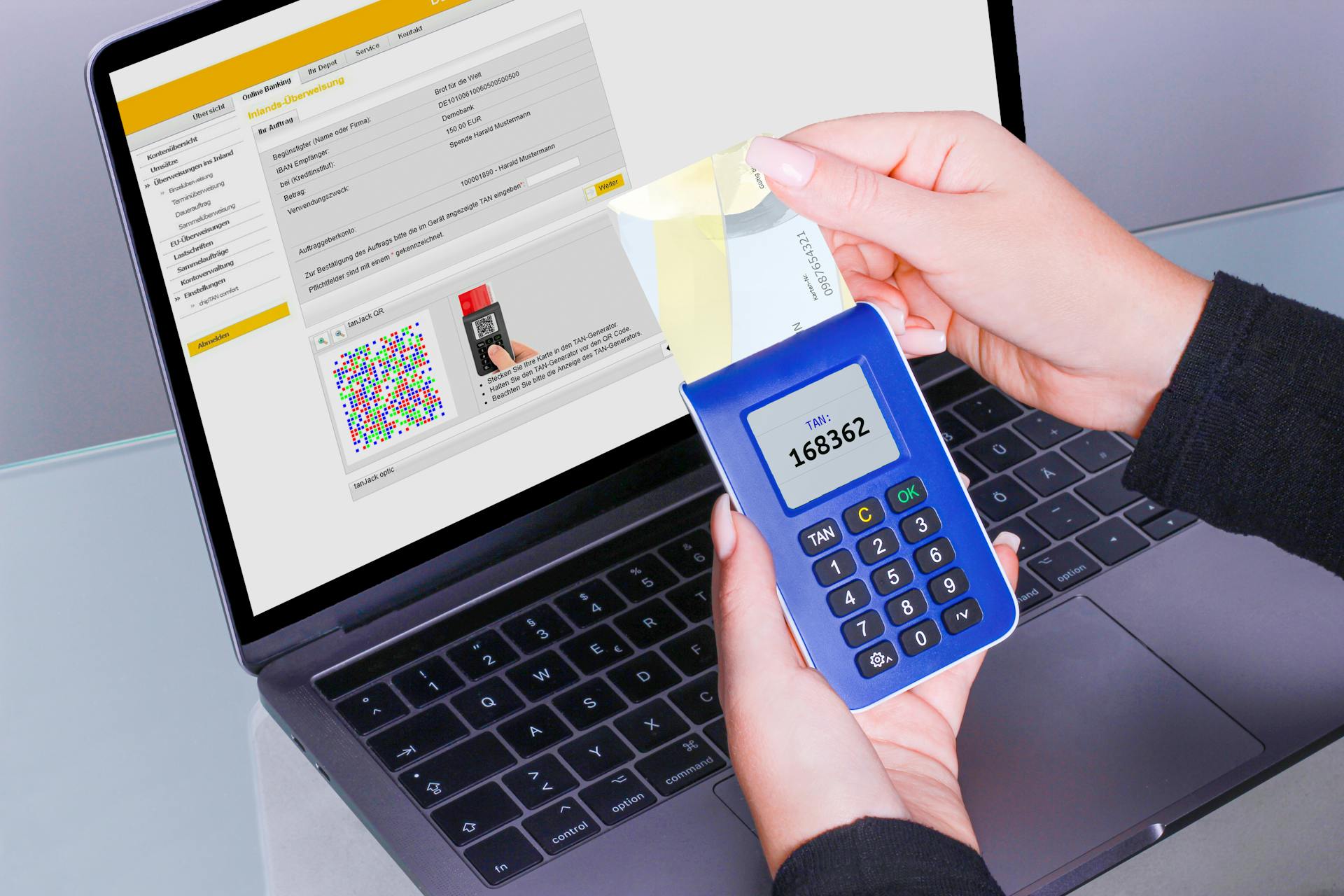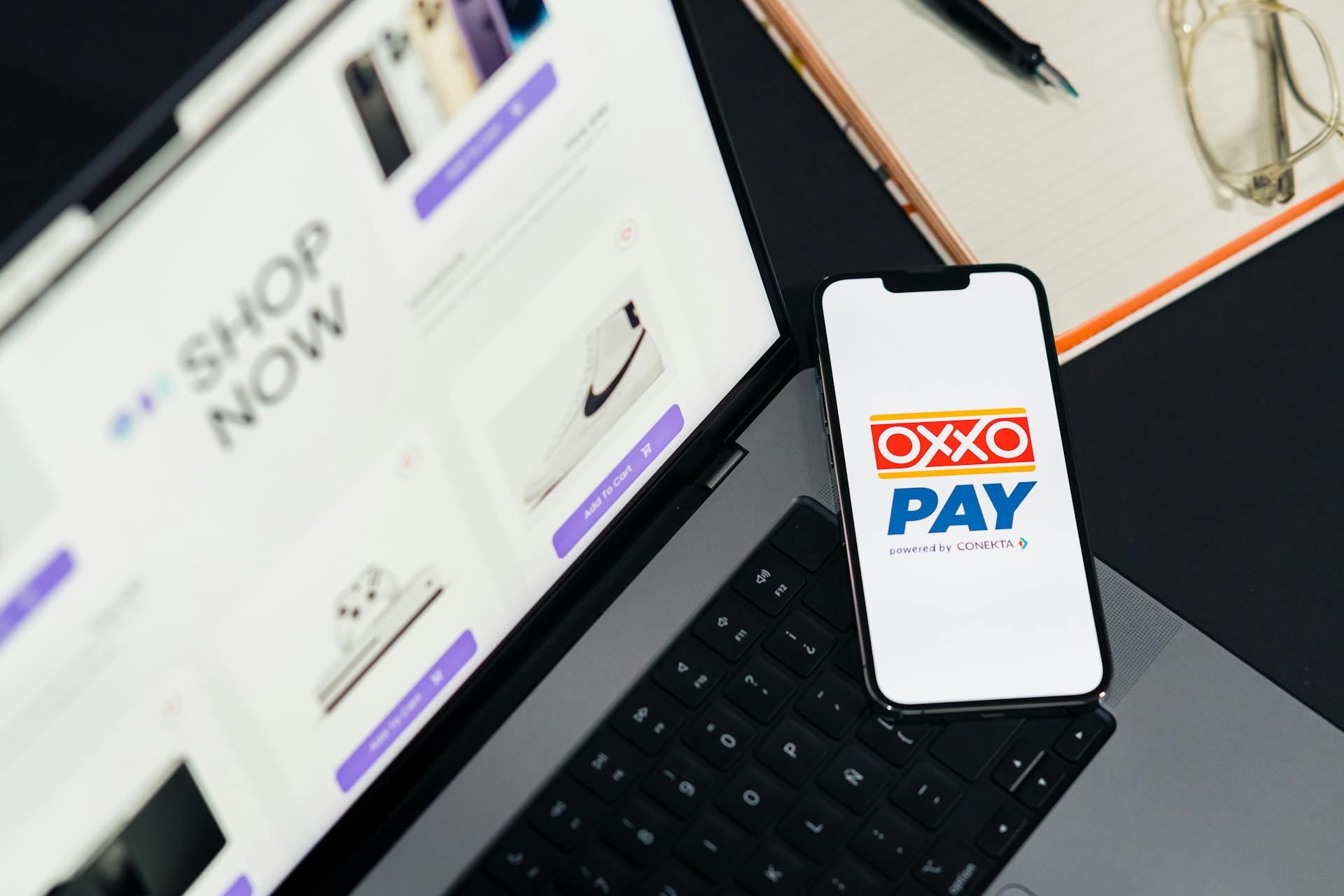
An online wallet is a digital storage system that allows you to store and manage your financial information, such as credit card numbers and bank account details. It's like a physical wallet, but instead of carrying a physical card, you have a digital one that can be accessed from anywhere.
Online wallets are designed to be secure, using encryption and other safety measures to protect your information. They often come with additional features like password managers and two-factor authentication.
These digital wallets can be linked to various payment methods, such as credit cards, debit cards, or even cryptocurrencies.
Broaden your view: Ethereum Wallet App
How Online Wallets Work
Online wallets are a convenient way to store your payment information and make transactions online. You can use them to make purchases in apps, on websites, or in stores.
To get started, you'll need to download the mobile app of your bank or use a trusted third-party digital wallet. This will allow you to store your credit card information, gift cards, and other payment details in a secure environment.
Related reading: Can I Use My Digital Wallet for Online Purchases

Digital wallets use technologies like Quick Response (QR) codes, Near Field Communication (NFC), and Magnetic Secure Transmission (MST) to enable payments. You can use these technologies to initiate payments by scanning a QR code, tapping your device near a payment terminal, or swiping your device like a credit card.
The contactless payment indicator on the retailer's point-of-sale system or card reader is a good sign that you can use your digital wallet. Look for the sideways Wi-Fi icon to make sure you're ready to pay.
Some digital wallets, like Venmo or Zelle, only allow you to send money to people with accounts on the same app. Not all retailers accept mobile payments, so it's a good idea to check before you make a purchase.
Here are some of the data types that digital wallets collect:
- Driver's license
- Social security number
- Insurance data
- Loyalty cards
- Any other documents needed for identification
These data types are then passed wirelessly to a merchant via NFC, making it easy to make transactions. The software component of the digital wallet encrypts your personal data to ensure it's secure.
Popular Online Wallets
Digital wallets have become increasingly popular, and some are more well-known than others. Cash App, Apple Pay, and Google Wallet are just a few examples of the many digital wallets available.
These digital wallets have different methods of functioning, with some allowing users to add funds directly to their wallet on their phone or device. Google's digital wallet service is one such example.
Some of the most popular digital wallets include Cash App, Apple Pay, Google Wallet, Samsung Wallet, PayPal, Venmo, AliPay, and Walmart Pay. Vodafone M-PESA is also worth mentioning, as it's a popular digital wallet in certain regions.
Here's a quick rundown of some of the most well-known digital wallets:
Examples of Online Wallets
Here are some popular online wallets that you might find useful:
Venmo is one of the most popular digital wallets, with over 80 million users. It allows for instant transactions and is a great way to send money to friends.
Cash App is another popular option, offering a range of services including buying stocks and converting cryptocurrency. It also meets the highest level of PCI DSS certification for payment security.
Google Wallet allows you to add funds to your wallet on your phone or device, making it a convenient option for online transactions.
PayPal is a well-established digital wallet that can store bank account information and debit and credit cards in one place.
Some digital wallets have unique features that set them apart, such as Venmo's social media-like platform where you can view and comment on friends' transactions.
Here are some examples of popular online wallets:
Digital wallets like Zelle and Dwolla offer secure and convenient ways to send and receive funds, with features like email address or cell phone number identification to protect your bank account.
Google is a popular online wallet available in 45 countries worldwide. I've used Google Wallet on my Android device to store digital keys and IDs, which is super convenient.
For added security, Google Wallet always encrypts your card information, so you can shop online with peace of mind. This feature gives me confidence when making payments online.
To make payments, Google Wallet requires a fingerprint or password, which adds an extra layer of security. I've used this feature many times and it's always worked smoothly.
Google Wallet is an updated version of Google Pay, which means it's got all the features of the original plus some new ones. The ability to store tickets and digital keys is especially useful for frequent travelers like me.
For another approach, see: Four Corners Model for Payment Security
Apple Pay
Apple Pay is exclusively available on iPhones, iPads, Apple Watches, and Mac computers. This means you can use it for both online and in-store transactions.
Thanks to NFC technology, payment is simple with Apple Pay. Users just need to unlock their devices and hold them near the point of sale for a seamless experience.
With Apple Pay, you can make online and in-store transactions with ease.
Intriguing read: Passbook Apple Wallet
Benefits and Safety
Digital wallets offer numerous benefits, including efficiency, contactless payments, and enhanced security. With a digital wallet, you can make transactions in real-time without needing a physical wallet.
Contactless payments are a convenient feature of digital wallets, allowing you to make purchases easily and securely without physically handling cash or cards. This reduces the risk of losing or misplacing your payment information.
Digital wallets are actually more secure than physical cards, thanks to heavy encryption and tokenization. This means that your actual card or account numbers are not stored within the digital wallet.
Encryption and tokenization work together to protect your information. When you add your personal info to a digital wallet, it's converted into a unique code via encryption that can only be accessed by authorized entities. Tokenization then replaces this sensitive data with a non-sensitive digital equivalent, known as a token.
These tokens are randomly generated every time you make a payment, and only the merchant's payment gateway can match them to accept the payment. This adds an extra layer of protection against fraudsters.
A fresh viewpoint: Online Real Time Bill Payment

Here are some key benefits and safety features of digital wallets:
- Efficiency: Digital wallets store financial information for convenient access, allowing users to transact in real time.
- Contactless: Make purchases easily and securely without physically handling cash or cards.
- Safe and secure: Digital wallets use encryption and tokenization to protect sensitive data.
- Multi-layered protection: Even if a retailer is hacked, your personal payment information is still protected.
Future of Payments
Digital wallets are making online and offline transactions a breeze, saving customers time and merchants making quicker sales.
Digital wallets are growing fast, with a significant increase in adoption rates among businesses. This is because they offer a swift, efficient, and convenient process that benefits all parties involved.
Although digital wallets aren't accepted everywhere yet, they're pushing businesses to adopt them even quicker. This is because they're a game-changer for customer convenience and merchant sales.
Frequently Asked Questions
Is Zelle considered a digital wallet?
Zelle is a peer-to-peer payment service, not a traditional digital wallet, but it can be used in conjunction with digital wallets for seamless transactions. Learn more about how Zelle integrates with popular digital wallets.
Is PayPal an online wallet?
Yes, PayPal is an online wallet that uses a customer's online profile and saved card information to make payments. It's a digital wallet that offers a convenient and secure way to shop online.
What is the best eWallet to use?
For now, Imo TNG eWallet is a top choice due to its wide acceptance by many stores. It's a convenient option for everyday transactions like groceries and dining out.
How can I pay with my digital wallet?
Add cards to your digital wallet and use it at checkout for instant purchase confirmation
Featured Images: pexels.com


